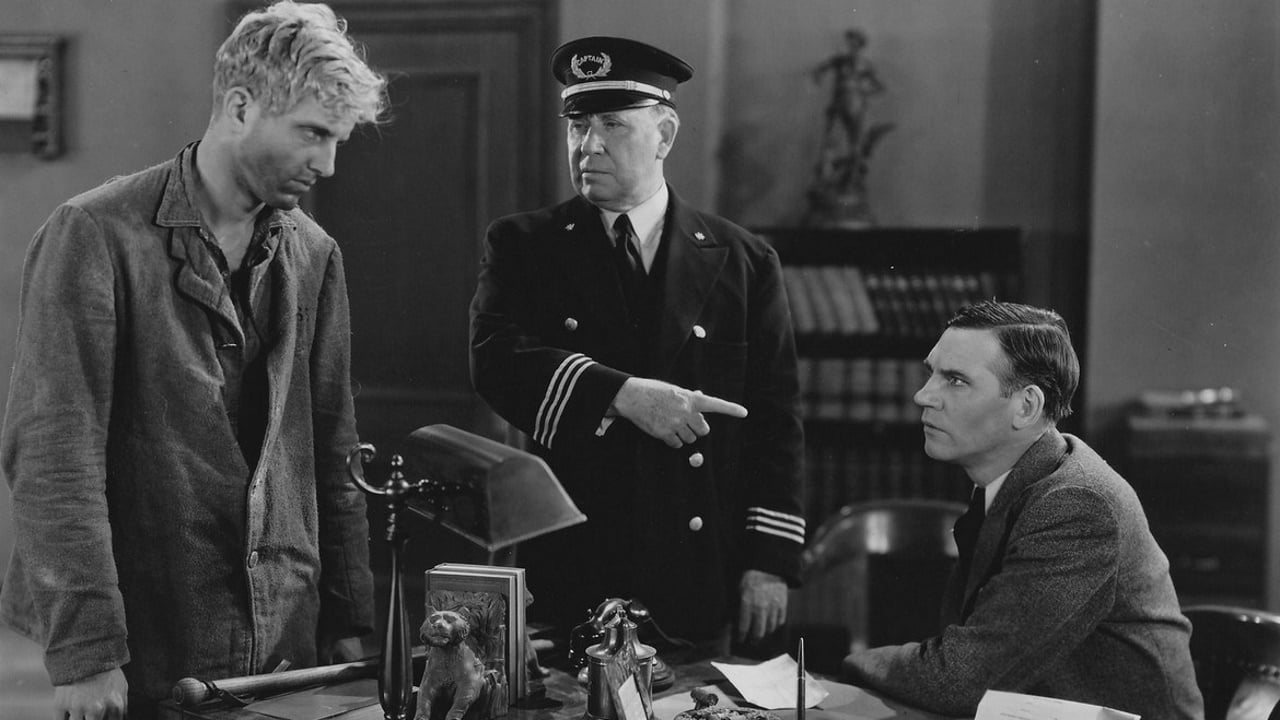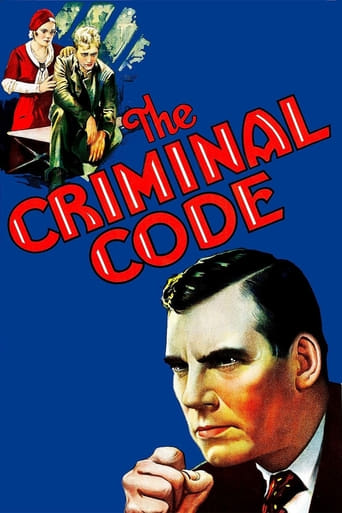

The Criminal Code explores the issue of turning a normal person who made a mistake into a criminal through time spent in prison and ends up abiding by the criminal code itself. The same subject matter is also explored in the movie Caged made 19 later; nothing seems to change. Robert Graham (Phillip Homles) is a sheltered pretty boy who got a rotten break (similar to Robert Montgomery in The Big House). However unlike Montgomery in The Big House, Graham is put in a cell with two guys (including Boris Karloff's Galloway) who look out for him. Although you do have to suspend your disbelief a bit over the movie fast forwarding six years and Graham not being remotely criminalised within that time. Among the film's examination of the American legal and penal system, Walter Huston explains how it would be possible for someone to get off the hook for a crime such as manslaughter; "A year's delay, a new trial, the witnesses would fade away, they always do, the whole mess would get cold, the paper's would have something else to yap about. I'd get him off; he'd never serve a day". Great thought provoking stuff.Walter Huston plays the warden of the unnamed prison. He is stern but fair and a real "Yes sir!" type as evident from his first appearance with the manner in which he addresses a female witness ("Never mind that, pull down the shade"). The man is one lightening fast talker who can interrogate like a boss but his greatest of moment on badassery comes from the scene in which he goes into the prison yard to confront protesting, yammering prisoners face to face without any guards. Just look at the way he walks into the yard and lights up a cigar. As he approaches the prisoners the yammering stops and they don't lay a hand on him. Simply put, this guy is badass. Perhaps unrealistically so but that's why we have movies.The Criminal Code was Boris Karloff's first significant screen role in the part of Galloway. With his dominating, tall, lanky figure he steals the show; his monologue on why's he's in the slammer with the shadows across his face is hair raising stuff. Galloway has a vengeance with a guard named Gleason which gives the film some dark comic relief such as the two awkwardly passing each other on the stairs to Karloff's recurring use of the lines "I don't like you" and "I got an appointment with you". Likewise the other memorable cast member, albeit in a very brief role is Andy Devine who is very hard to miss with that highly distinctive voice of his.The Criminal Code uses the same set created for MGM's The Big House released the year before. With its more intricate cinematography the film doesn't capture the sense of claustrophobia seen in The Big House but still captures the mundanity of prison life. As an early talkie there is no music present in The Criminal Code but rather the sound of prisoners marching along with various other sound effects are just as effective as any music score could be. The Criminal Code is also host to one of the most shocking moments in pre-code cinema (and was even featured in Karloff film Targets from 1968). When Galloway chases a squealer into a room while yammering is going on in the background from the prison yard, Galloway walks into the room with the squealer cornered as he slowly closes the door as the squealer looks on in terror. What happens next is up to the viewer's imagination.
... View MoreAnother Overrated Howard Hawks Film. Here are Two Examples when that "Hawksian" Touch just about makes the Movie Unbearable. First in the Opening Scene Two Policemen are Playing Cards and one loses 42 cents. They are Called Out on a Case, They Argue about 42 cents in the Police Station, out the door, in the car, out of the car, and into the Crime Scene. This is not Entertaining, Funny, or Natural. It is Howard Hawks just being His Obnoxious Self.The Second Thing. He Allows Walter Huston to say "Yeah" Every time He Opens His Mouth. He Prefaces Sentences with "Yeah", He Ends Sentences with "Yeah", He says "Yeah" in the Middle of Sentences, and He says "Yeah" just for Emphasis. This is Hawks Once Again Annoying Audiences with His Style Until They Scream for Relief.The Rest of the Movie is Not Bad. Boris Karloff Steals the Show as a Truly Scary Looking Inmate and some of the Mugs in the Yard are some Hard Bitten Characters (No Blacks). The Film is Talky and some of the Conversations go on for Ever and the Dated Dialog Deliveries can be Cumbersome at Times, but Overall it is Worth a Watch for an Example of Early Hollywood despite Everything the Director does to Drive You Away.
... View MoreThe lessons unlearned belong to Walter Huston's character, Mark Brady, but I'll get to that later.Philip Holmes plays Robert Graham, a young man of twenty who gets into an altercation in a dance hall and ends up killing the other guy, someone he's never even met before. D.A. Mark Brady is not a man without compassion. He even states how, were he the defense attorney, he would get the boy off without serving a day. As a result, he sends him up for manslaughter rather than murder. However, that is still ten years, and six years into the sentence Graham is a man who is losing hope and his sanity.In an odd twist of fate D.A. Mark Brady becomes warden of the prison, a place inhabited by many of the men he helped convict. The prison doctor comes to Brady with a request - let Graham be Brady's private driver for awhile, to get him out of the prison factory. Brady agrees. A few short months later and Graham is beginning to have a new lease in life. Plus, there is a complication - he is falling in love with Brady's daughter. However, an event soon occurs at the prison that threatens Graham's hope for a better future.As for the lessons unlearned, the one quirky thing about this film is how D.A. turned prison warden Brady keeps saying "you've go to take things how they break", never realizing that in many cases - exhibit A being the case of inmate Robert Graham - Brady is in total control of how things break, in particular the fact that Robert Graham, a basically square kid, is an inmate in the first place. However, at least Brady is not a hypocrite, since he seems to be willing to take the good with the bad in his own life as well. A pretty complex character for an early 30's film.Of course all classic movie fans are familiar with Walter Huston and his many abilities and roles. However, most people will not have heard of Philip Holmes. Partly this is because his early successes in film did not lead to better things as the 1930's progressed, and the rest of the reason is that many of his early successes occurred at Paramount, whose early films have been largely unseen for decades. This is worth checking out. The screenplay was nominated for an Oscar, and the performances are quite good.
... View MoreSometimes you seem to get into a position where you have to take your medicine for an even unintended actions. That is what happens to poor 20-year-old Bob Graham, and within 10 minutes into the movie, he's in the infinite world of prison, where he must learn yet another set of codes of the criminal sort. Creepy Ned Galloway (Boris Karloff just before his "Frankenstein" turn) takes a rather minor (at least early on) role and fills it with gusto (maybe its that creepy little haircut) in a claustrophobic cell. Later, he does the right thing for rehabilitated and soon-to-be-paroled (maybe) Graham, who does not violate the titular Criminal Code (since he's still a con).James Whale wanted Karloff for his monster after seeing Boris in this flick, and after you see it, you'll know why.BTW, who doesn't love a good prison movie yarn, and with Karloff in it, it rates a "9."
... View More